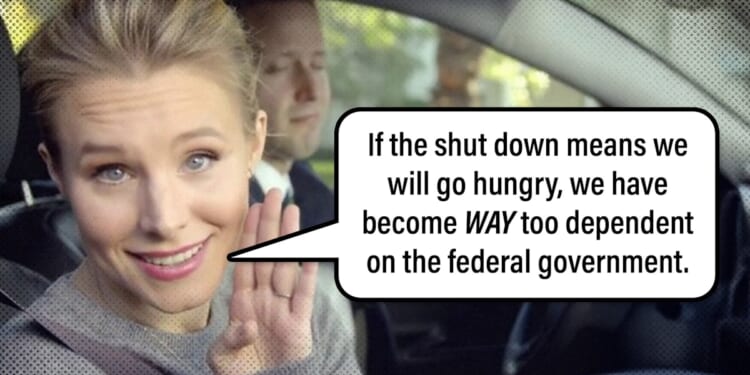On November 1, millions of Americans who rely on food-assistance programs may find their benefits frozen. The looming disruption due to the Democrats’ ongoing government shutdown is shining a much-needed light on the long-standing issue of increased reliance on welfare programs.
As the conversation about people losing SNAP benefits has dominated social media over the last several days, the shocking reality of just how many people rely on government assistance is as concerning as the prospect of not issuing that assistance for the month of November.
Roughly 42 million people receive food from the Supplemental Nutrition Assistance Program (SNAP) in an average month. Monthly benefits are put onto electronic transfer cards, but as the government remains at a standstill, millions of cards will not be loaded beginning this Saturday.
It’s fair to worry about people who genuinely need help and have no other options. But let’s be honest — the outrage we’re seeing from so many recipients says a lot. What was supposed to be a short-term safety net has become a way of life for too many. And honestly, without the Democrats’ government shutdown, many Americans might never have seen just how big the dependency problem the Democrats created has become.
With the ongoing federal-funding impasse, and the U.S. Department of Agriculture (USDA) making the official announcement that it cannot guarantee that benefits will be issued on November 1 for SNAP recipients, panicking SNAP recipients have flooded social media with videos, sharing their plans to take from the system, regardless of how they have to do it.
The New York Post highlighted some of these videos. One woman on an unhinged rant yelled, “I’ma tell y’all straight up like this, I just got that text that the link is definitely cut the f**k off for November. Y’all better stay the f**k out of my way in these stores because I’m walking out with carts and I’m not paying for s**t.”
Another added: “You know what? Since they wanna take food stamps away, I’m gonna go to f**king Walmart, grab anything I damn want, put that s**t right in the basket and walk right up out that b***h … I’m not paying for a damn thing.”
One woman even pushed for a mass organized theft event, with the idea that overwhelming the stores would keep most of them from getting caught. “November 3rd at 6:30 we’re going to Walmart … and at 7:30 we’re going to walk out of Walmart with our buggies.”
While the hysterical reactions are appropriate to mock, as they clearly do not consider all the ways this could go poorly, they also underscore a criticism frequently made by those on the Right. Conservatives are often the loudest voices for personal responsibility, hard work, and human potential. When able-bodied adults treat assistance as entitlement rather than emergency support, it can erode the incentive to seek employment, develop self-reliance, or strive for more than just survival.
In my opinion, there’s nothing wrong with a temporary safety net — emphasis on temporary. It’s meant for people in a rough patch, which everyone goes through at one point or another. Whether they’re between jobs, dealing with real hardship, or facing genuine physical or mental limitations, asking for help is encouraged. But when able-bodied, working-age adults turn an offer for help into a lifestyle they refuse to move past, that’s a different story.
The longer people stay on government assistance, the harder it is to remember what independence even feels like. And what we’re seeing now isn’t just a hiccup in benefits, it’s a full-blown public panic attack by people who are crippled at the thought of having to solve their own problems. Their entitlement has reached a point where they are more willing to risk going to jail for stealing than put the effort into finding work or coming up with solutions that don’t involve taking from others.
The sizable population that has become dependent on endless handouts demonstrates an alarming level of reliance on others, in a country where the founding principles are based on the idea that the sky is the limit on what you can achieve.
Today, with one in eight Americans relying on SNAP and similar programs, it feels like we’ve taken a real nosedive as a nation. The men who fought alongside George Washington for America’s independence would probably be speechless watching modern Americans risk jail time over a “free” bag of chips and a soda rather than lift a finger to feed themselves.
These reactions also underscore that the reforms Donald Trump’s administration pushed earlier this year — tougher rules around work, education, or service requirements to receive assistance — weren’t just political posturing. They were long overdue. As one Newsweek article noted, the new rules require “able-bodied adults … up to age 64” to meet work or training expectations to qualify.
Make no mistake: The behavior we’re seeing now — those threatening to steal from stores if their benefits drop — is the clearest picture yet that these measures may not even be enough. In far too many cases, it’s not about needing help. It’s about expecting it or taking it.
In short, the system is large, public frustration is growing, and the political will for reform is hardening.
The government shutdown, which chokes off benefits in November, may have been the wake-up call needed to expedite efforts to root out abuse and get people back in the game who have given up on their own capacity for personal success.
The crisis has made the lines even more distinct: people in genuine need who depend on the program versus recipients who treat benefits as a bottomless pit, undermining the system’s original purpose.
If food assistance is supposed to help people get back on their feet, the current outrage and threats of looting show we’ve drifted way off course.
Ironically, this whole moment is another Democrat move that has backfired in a big way. While critics said stricter requirements on welfare were cruel and heartless, now the calls for reform are louder than ever. Hardworking Americans are done footing the bill for grown adults who have accepted the lie that they are victims and that they are owed everything, while they contribute nothing.
Let’s be real: If you’re able-bodied enough to push a cart full of groceries out of a store without paying, you’re able-bodied enough to push that same cart at work. If you’ve got time to plan a mass theft, you’ve got time to fill out job applications. And if you’re willing to risk jail time, you can handle a shift or two.
What we need now are tighter eligibility rules, real time limits, and work requirements that actually mean something. Assistance is a bridge — not a destination.

















